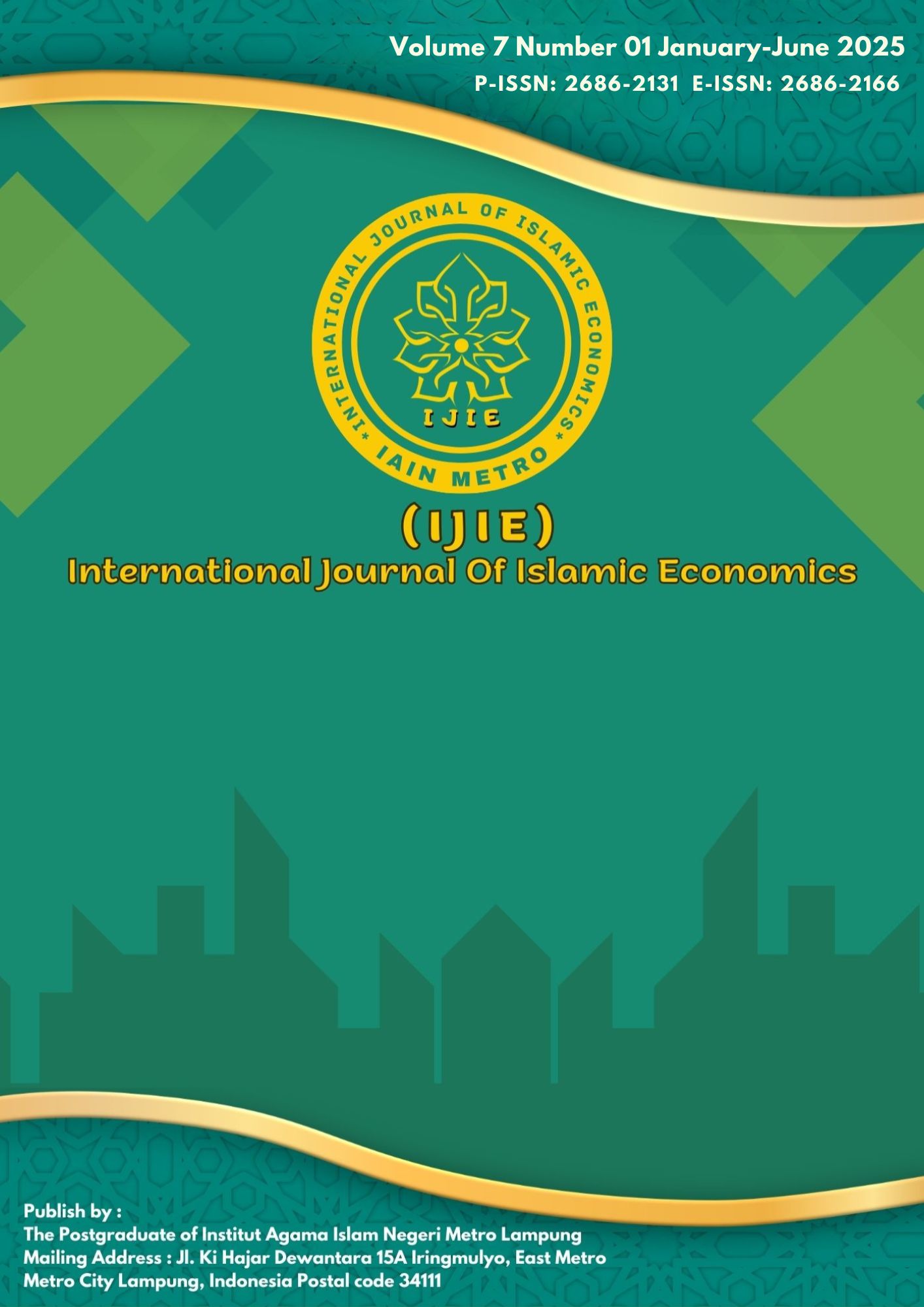Digitizing Professional Zakat Through Payroll Systems: A Maqashid Shariah-Based Approach to Achieving the SDGs
DOI:
https://doi.org/10.32332/ijie.v7i01.10254Keywords:
Professional Zakat; Payroll System; Sustainable Development Goals; Maqashid Syariah.Abstract
Introduction: Professional zakat is an Islamic financial instrument contributing to economic redistribution and poverty alleviation. In Indonesia, professional zakat has been accommodated in various regulations, including in PT PLN, which applies automatic deduction through the payroll system based on Board of Directors Regulation Number 120.P/DIR/2017. Objective: This study aims to analyze the implementation of professional zakat through the payroll system at PT PLN, from a maqashid sharia perspective, and its impact on achieving the Sustainable Development Goals. Method: This research used a qualitative approach with a case study method, involving interviews, observation, and document analysis. Result: This study found that professional zakat in PT PLN is automatically deducted by the payroll system by the Human Capital Management Division from the salaries of Muslim employees according to the nishab and managed by the PLN Baitul Maal Foundation. This implementation facilitates the obligation of zakat and follows the principles of maqashid sharia, and contributes to poverty reduction, education, and economic empowerment in achieving Sustainable Development Goals. Implication: This research shows that the payroll system in professional zakat ensures sharia compliance, contributes to social welfare, and accelerates the sustainable achievement of the Sustainable Development Goals.
Downloads
References
Al Mustaqim, D., & Makarrim, A. (2024). YBM PLN’s Strategy in Supporting SDGS through ZIS Potential in Maqashid Syariah Perspective. International Journal of Islamic Economics, 6(01), 1. https://doi.org/10.32332/ijie.v6i01.8855
Alfiani, T., & Akbar, N. (2020). Exploring Strategies to Enhance Zakat's Role to Support Sustainable Development Goals (SDGs). International Conference of Zakat, 295–310. https://doi.org/10.37706/iconz.2020.226
Amelia, N., Rahmawati, R., Lismawati, L., & Khairi, R. (2023). Urgensi Ziswaf Dalam Pengembangan Perekonomian Di Indonesia. Sharing: Journal Of Islamic Economics, Management And Business, 2(2), 157–168. https://doi.org/10.31004/sharing.v2i2.23408
Anwar, W. R., & Wardani, S. S. (2023). Pengelolaan Zakat Profesi Menurut Yusuf Al-Qardlawi dan Relevansinya dengan Undang-Undang No. 23 Tahun 2011 Tentang Pengelolaan Zakat. Journal of Economic and Business Law Review, 3(2), 103. https://doi.org/10.19184/jeblr.v3i2.43007
Atikah, I. A. I., Solehuddin, E., Ridwan, A. H., & Hadiat, H. (2024). Ikhtilaf Ulama Kontemporer: Eksistensi Zakat Profesi Di Era Modern. IQTISHOD: Jurnal Pemikiran Dan Hukum Ekonomi Syariah, 3(2), 100–114.
Baidhowi, M. M., & Triwibowo, A. (2023). Zakat Management Improvement Strategy Efforts to Maintain Muzakki Trust. Journal of Contemporary Applied Islamic Philanthropy, 1(1), 1–10. https://journal.nubaninstitute.org/index.php/jcaip/article/view/9
Fajrina, A. N., Putra, F. R., & Sisillia, A. S. (2020). Optimalisasi Pengelolaan Zakat: Implementasi dan Implikasinya dalam Perekonomian. Journal of Islamic Economics and Finance Studies, 1(1), 100. https://doi.org/10.47700/jiefes.v1i1.1918
Hamdiah, V. (2024). Peran Kebijakan Fiskal Dalam Mengevaluasi Zakat Sebagai Upaya Menyikapi Kemiskinan Di Indonesia. Jurnal Ilmiah Ekonomi Islam, 10(1), 333. https://doi.org/10.29040/jiei.v10i1.12257
Hizbullah, M., Hadir, H., & Yeltriana, Y. (2023). Hukum Zakat Profesi Dalam Tinjauan Maqasid Syar’iyah. Taqnin: Jurnal Syariah Dan Hukum, 5(01). https://doi.org/10.30821/taqnin.v5i01.15369
Hutahaen (2015). (2018). Metode penelitian kuantitatif, kualitatif dan R & D. Sistem Informasi, 2(Cdc), 1–4.
Jamal, J. (2022). Studi Ayat-Ayat Zakat Profesi Sebagai Kajian Dalam Ekonomi Islam. Saqifah: Jurnal Hukum Ekonomi Syariah, 7(1984), 55–66.
Maulana, N., & Satibi, I. (2024). Kontekstualisasi Objek Zakat Era Kontemporer di Indonesia: Aset Keuangan Publik Dalam Pembangunan Bangsa. Jurbal Iqtisaduna, 10(1), 64–86.
Muchtar, M. I., & Rapung, R. (2024). Analisis Hukum Islam Terhadap Zakat Profesi Dalam Tinjauan Maslahat. Journal of Islamic Constitutional Law, 1(1).
Mustaqim, D. Al, & Yasin, A. A. (2023). Strategi Fundraising Zis Melalui Sistem Berbayar Non Tunai Qris Di Baznas Kabupaten Cirebon. Masile, 4(1), 40–55. http://jurnal.staima.ac.id/index.php/masile/article/view/59
Mustaqim, D. A. M. (2024). Development of Corporate-Based ZISWAF Fundraising Model in Realizing SDGs from Maqashid Syariah Perspective. International Economic and Finance Review, 3(1), 31–50. https://doi.org/10.56897/iefr.v3i1.46
Mustaqim, D. A. M., & Yasin, A. A. (2023). Dampak Implementasi Quick Response Code Indonesian Standard (Qris) Dalam Fundraising Zakat Infaq Sadaqah (Zis) Di Badan Amil Zakat Nasional (Baznas) Kabupaten Cirebon --- Perspektif Hukum Ekonomi Syariah. Sahid Business Journal, 3(1), 1–16. https://doi.org/10.56406/sahidbusinessjournal.v3i1.87
Nurhakim, L., & Budimansyah, S. (2024). Kajian Pustaka tentang Kontribusi Zakat dalam Mengatasi Kemiskinan di Kalangan Umat Islam Modern. JICC: Jurnal Intelek Insan Cendekia, 1(September), 2479–2493.
Suprayitno, E. (2019). Zakat and SDGs : The Impact of Zakat on Economic Growth, Consumption and Investment in Malaysia. 2018 International Conference on Islamic Economics and Business (ICONIES 2018), 202–209. https://doi.org/10.2991/iconies-18.2019.39
Yahya, I., Sahidin, S., Rohayana, A. D., Ananda, M. A., & Sopyan, Y. (2024). The Effectiveness of The Payroll System in Increasing Potential and Zakat Collection in Indonesia. International Journal of Islamic Business and Economics (IJIBEC), 8(1), 127–139. https://doi.org/10.28918/ijibec.v8i1.6914
Yayasan Baitul Mal PLN. (2023). Annual Report Yayasan Baitul Mal PLN 2023.
Downloads
Published
Issue
Section
License
Copyright (c) 2025 Dede Al Mustaqim, Toto Suharto, Afif Muamar

This work is licensed under a Creative Commons Attribution-ShareAlike 4.0 International License.








